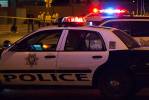Marijuana, prescription drugs are top substances in schools
During a workshop last month covering the newest street drugs and trends, educators made a chilling observation about student drug use. The consensus was that one-quarter of students are involved with drugs at school.
Nine Clark County School District counselors, deans and administrators from middle schools and high schools attended the Sept. 12 workshop at the district's Curriculum and Professional Development Center, 3950 S. Pecos-McLeod.
The district's Office of Safe and Drug-Free Schools hosts classes throughout the year to educate staff members on topics such as domestic violence, gangs, human trafficking, bullying and more.
The three-hour workshop - Substance Abuse Awareness: Street Drugs, Trends and Addiction - started with a presentation by school district police officer Steve Ufford, one of 168 on the force. Ufford usually is stationed at Chaparral High School, 3850 Annie Oakley Drive.
Marijuana and increasingly popular synthetic marijuana are the biggest drugs in schools, Ufford said. Synthetic marijuana has many nicknames, including "spice," and is sold in smoke shops and online as incense.
This is a popular time of the year for drug use, too.
"We're in the season of homecoming right now," Ufford said. "You could see it at a dance or a (football) game."
Ufford also said the environment contributes to high drug use in the school district.
"We're a partying town," Ufford said. "That's our culture in Vegas, and it trickles down into our schools."
The district caught 2,459 students with drugs during the 2011-12 school year, down from 2,503 students the previous year .
Those students were sent to alternative or behavioral schools with others who were deemed offenders. Students must complete a six-hour substance abuse class with a parent before they can return to a regular school. Often, the district enrolls the student at a different school than the one they had been attending.
Second in popularity to marijuana in schools and quickly rising are prescription medications, usually obtained at home.
"I can't even put into words how common it is, kids selling their prescriptions at school," Ufford said.
There were 1,680 cases of marijuana possession last year and 389 prescription drug cases. There were fewer than 25 combined cases of methamphetamine, cocaine and heroin at school. About 75 percent of students sent to behavioral schools were high school students.
Also presenting at the workshop was a former high school drug addict, Michael Fildes, who graduated from Faith Lutheran Jr/Sr High School in 2008. Fildes is coordinator for the Foundation For Recovery's Helping Young People Experience Recovery program .
Fildes and other young adults in long-term recovery give free presentations to students and teachers in the district . The program was founded in October 2011 and focuses primarily on prevention and education but also offers support groups, coaching and training and other resources.
For more information, visit forrecovery.org/hyper or call Fildes at 257-8199, ext. 913.
The Metropolitan Police Department announced last month that it would end D.A.R.E., its youth anti-drug education program, beginning this school year due to police budget restraints.
Jodi Joyce, coordinator for Safe and Drug-Free Schools, wanted parents to know that even with the end of D.A.R.E., the school district will continue promoting its own anti-drug curriculum. D.A.R.E. was only a part of the school district's approach, she said.
"We do drug prevention in (kindergarten) through (12th grade)," Joyce said. "We've been doing this all along."
Joyce and her staff make weekly trips to schools, usually upon request from principals, to give presentations to students.
Many educators, especially those who teach health, receive training on anti-drug education and incorporate it into their lessons. Joyce also said that teachers and administrators who take these types of training sessions usually go back to their schools and share the information with their staff, thus increasing the program's reach.
For more information on Safe and Drug-Free Schools, call 799-8411.
Contact View education reporter Jeff Mosier at jmosier@viewnews.com or 224-5524.





























